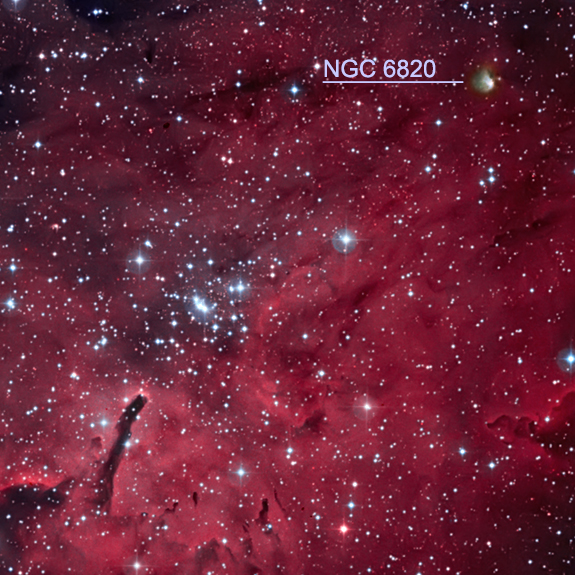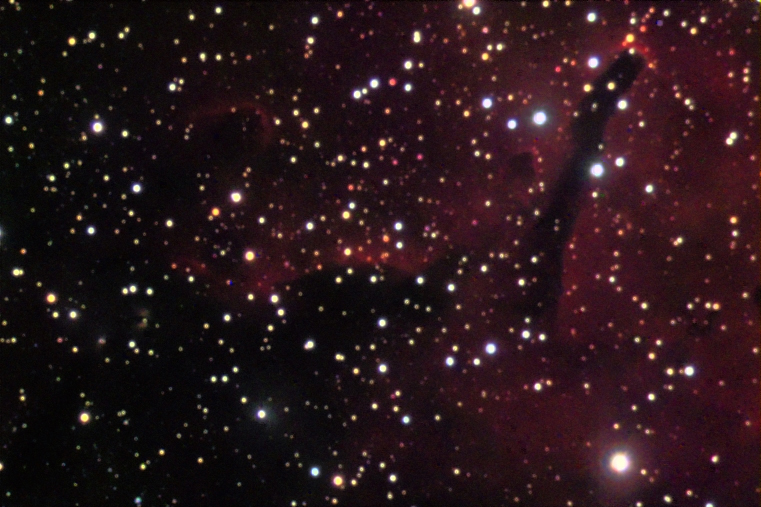|
|

|
Instrument |
12.5" RCOS @
~f/9 (2880 mm fl) 0.64 arcsec / pixel. The Zoomify image scale
is 1.28 to 3.07 arcsec / pixel. |
|
Mount |
Paramount ME |
|
Camera |
SBIG STL-11000 w/ internal filter wheel, AstroDon Gen I Filters |
|
Acquisition Data |
8/30/2010 to 10/11/2010 Chino Valley, AZ... with CCDAutoPilot3
& CCDSoft. AOL guided |
|
Exposure |
Lum (no filter)
225 min (15 x 15 min, bin 1x1)
Ha
570 min (19 x 30 min. bin 1x1)
RGB
270 min ( 6 x 15 min each, bin 2x2)
Click
here for the narrow band color mapped image.
Click here for the B & W Ha filtered image) |
|
Software |
-
CCDSoft, CCDStack,
Photoshop CS w/ the Fits Liberator plugin, Noel Carboni's actions.
-
eXcalibrator for (b-v), (v-r) color calibration, using 20 stars
from the NOMAD1 database.
-
PixFix32 (pre-beta) to
repair column defects & pixels.
-
CCDStack to calibrate,
register, normalize, data reject, combining the sub exposures
and LRGB combine
-
PhotoShop for
non-linear stretching,
LLRGB combine and adding Ha data to the final red channel.
|
|
Comment |
North is to the left.
The emission nebula, Sh2-86, and the open star cluster, NGC 6823,
are located in the constellation Vulpecula, at a distance of about
6000 light-years. The Sh2-86 nebula
surrounds and is illuminated by the cluster. The remarkable pillar
like features, below and left of NGC 6823, are probably formed by
radiation from the brightest nearby cluster stars. The shape
of the dark elongated nebula structures noticeably point back to the
star cluster.
As clarified by Sakib
Rasool, of StarSurfing,
Sh2-86 is usually misidentified as NGC 6820. NGC 6820 is the
small white/blue reflection nebula in the upper right corner of the
above second image. This image was assembled with red and blue
data from the 2nd Digitized Sky Survey (DSS2). The digital data were
created by scanning the Second Palomar Observatory Sky Survey (POSS
II).
|
════════════════════════════════════════

|
Instrument |
Celestron C11 @ F/6.1
(1705 mm) 1.087 arcsec / pixel |
|
Mount |
Losmandy G11 |
|
Camera |
SBIG ST-7 with
CFW-8A color wheel |
|
Acquisition Date |
8/24/05 to 8/26/05
Near downtown Seattle |
|
Exposure |
Lum 270 min
(15 X 15 min)
Red 80 min (8 x 10, bin 2 x 2)
Green 50 min (5 x 10, bin 2 x 2)
Blue 45 min (3 x 15, bin 2 x 2) |
|
Software |
CCDSoft, FocusMax,
CCDOPS, Sigma Clip (pre beta 11)and PhotoShop CS. The DitherMat was used to dither the Lumance
layer. |
|
Comment |
North is to the
left.
Taken only 3 miles
from downtown Seattle with very clear skies and about a 60% full
moon. This object needs dark skies and an H-Alpha filter with
30 minute exposures for the luminance layer.
I thought I could bring out
more detail on the left side, otherwise I would have positioned the
camera more to the right.
|
|